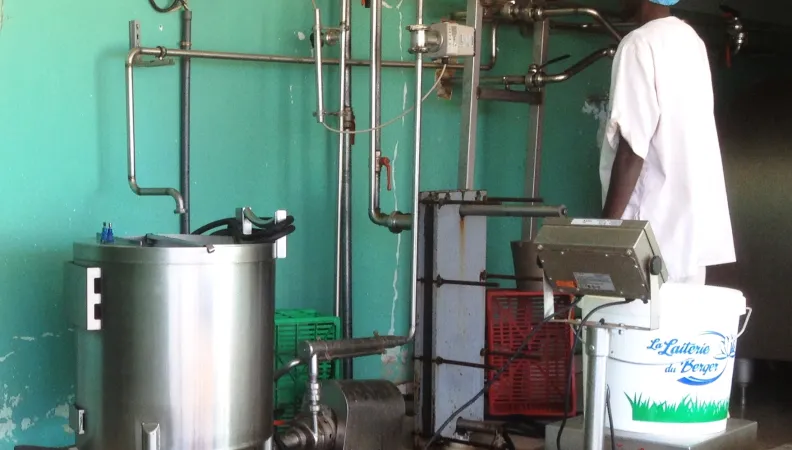Share the page
FISP Climat - Energy optimisation of the Laiterie du Berger processing plant (LDB SOLAR)
Project


-
Project start date
-
Status
Completed
-
Estimated date of project termination
-
-
Project financing date
-
-
Financing duration
-
10 years
-
Type of program
-
FFEM
-
Global financing amount
-
2196174 €
-
FFEM financing amount
-
500000 €
-
Project lead member institution(s)
-
French Ministry of Economy and Finance
-
Country and region
-
Senegal
-
Type of financing
-
Grant
-
Beneficiaries
-
Panamint Energy Africa
-
Type of beneficiary
-
private sector
Supporting Paramint Energy Africa in order to provide an energy solution that covers the electricity and thermal needs of the Laiterie du Berger processing plant as part of its yoghurt production industrial activities in Richard-Toll in northern Senegal.
Context
Senegal is facing a profound and persistent energy crisis which is hampering the performance of the national economy. In spite of efforts made by the public authorities, the electricity supply is still not enough and its production is costly, mainly provided by thermal power stations and distributed through a network with limited capacity.
Despite the universal role of energy in the implementation of public policy, its low rate of penetration acts as a halt on the development of the country. A stable, durable energy supply to industrial sites enables them to lower their dependence on hydrocarbons and relieve some of the pressure on the Senegalese electricity distribution grid. This decentralised production therefore contributes to making networks stronger.
Description
The project is structured around two phases:
- During the first semester 2015: installation of a 152 kW photovoltaic solar electricity production unit and a 127 kW thermal solar heat production unit. The installed powers and their consumer coverage rates may be optimised following a campaign of on-site measures to be performed prior to the detailed studies.
The photovoltaic facility is paired with a battery storage system enabling a fluid transition between the different supply sources (grid, solar and generator). This storage is therefore not intended to replace the grid, but rather to provide an energy supply while the generator is being started up, avoiding any interruption in supply. - Secondly, an extension of the production units (PV and Thermal) will be developed to achieve an installed power of around 580 kW (+/- 300 kW PV and 280 kW thermal). This phase enables the Berger Dairy to receive support for its planned production plant extension aimed at tripling its production capabilities. The design of the facilities created takes into account the future extension in order to minimise production costs. This second phase should come about in 2016, according to the company’s growth simulations.
Outcomes
- Environmental
The use of solar energy for the production of electricity and heat is deemed to be one of the cleanest energy production solutions.
The project will enable the avoidance of 140 tonnes of CO2 being emitted if thermal needs are covered 58%, and 170 tonnes if 80% of needs are covered.
- Socio-economic
Thanks to this project, the Berger Dairy will partially release itself from a defective and costly local electricity supply and from the volatility of energy prices. It’s also optimise the management of its production tool while avoiding power-cuts and therefore gain in productivity, releasing an additional amount to enable it to invest in its core field and boost local jobs. Finally, it demonstrate its status as Senegalese pioneer in sustainable development.
Panamint Energy Africa intends to encourage the emergence of a quality renewable energy industry and especially photovoltaic and thermal solar energy in Senegal and West Africa with the support of its European partners and their local networks.


